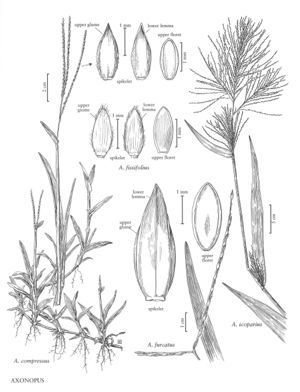Difference between revisions of "Axonopus fissifolius"
FNA>Volume Importer |
FNA>Volume Importer |
||
| Line 20: | Line 20: | ||
-->{{Treatment/Body | -->{{Treatment/Body | ||
|distribution=Puerto Rico;Va.;Okla.;Miss.;Tex.;La.;Calif.;Ala.;N.C.;S.C.;Pacific Islands (Hawaii);Ga.;Fla.;Ark. | |distribution=Puerto Rico;Va.;Okla.;Miss.;Tex.;La.;Calif.;Ala.;N.C.;S.C.;Pacific Islands (Hawaii);Ga.;Fla.;Ark. | ||
| − | |discussion=<p | + | |discussion=<p>Axonopus fissifolius is sometimes used as a lawn or pasture grass, but it is also an invasive weedy species, often growing in moist, disturbed sites. It is native in the southeastern United States and from central Mexico south to Bolivia and Argentina. It has also been introduced into tropical and subtropical regions of the Eastern Hemisphere.</p> |
|tables= | |tables= | ||
|references= | |references= | ||
| Line 36: | Line 36: | ||
|basionyms= | |basionyms= | ||
|family=Poaceae | |family=Poaceae | ||
| + | |illustrator=Linda A. Vorobik and Karen Klitz | ||
|distribution=Puerto Rico;Va.;Okla.;Miss.;Tex.;La.;Calif.;Ala.;N.C.;S.C.;Pacific Islands (Hawaii);Ga.;Fla.;Ark. | |distribution=Puerto Rico;Va.;Okla.;Miss.;Tex.;La.;Calif.;Ala.;N.C.;S.C.;Pacific Islands (Hawaii);Ga.;Fla.;Ark. | ||
|reference=None | |reference=None | ||
| Line 41: | Line 42: | ||
|publication year= | |publication year= | ||
|special status= | |special status= | ||
| − | |source xml=https:// | + | |source xml=https://bibilujan@bitbucket.org/aafc-mbb/fna-data-curation.git/src/314eb390f968962f596ae85f506b4b3db8683b1b/coarse_grained_fna_xml/V25/V25_1437.xml |
|subfamily=Poaceae subfam. Panicoideae | |subfamily=Poaceae subfam. Panicoideae | ||
|tribe=Poaceae tribe Paniceae | |tribe=Poaceae tribe Paniceae | ||
Revision as of 16:15, 30 October 2019
Plants usually cespitose, sometimes stoloniferous, nodes of the stolons often pilose. Culms 10-75 cm, erect or depressed-decumbent; cauline nodes glabrous or slightly pubescent. Sheaths compressed, mostly glabrous, margins ciliate; ligules 0.2-0.4 mm; blades 4-15 cm long, 1.5-6 mm wide, flat, mostly glabrous, margins with papillose-based cilia. Panicles terminal and axillary, 5-11 cm overall, rachises to 3 cm, with 2-7 branches; branches 2-9(12) cm, spreading or ascending. Spikelets 1.6-2.2(2.8) mm, ovoid or ellipsoid, obtuse to acute. Upper glumes and lower lemmas scarcely extending beyond the upper florets, 2-veined, margins sparsely pilose, apices obtuse to subacute; upper lemmas and paleas 1.6-2.1 mm long, 0.5-0.7 mm wide. Caryopses 1.5-1.8 mm, gray. 2n = 20, 40, 80, 100.
Distribution
Puerto Rico, Va., Okla., Miss., Tex., La., Calif., Ala., N.C., S.C., Pacific Islands (Hawaii), Ga., Fla., Ark.
Discussion
Axonopus fissifolius is sometimes used as a lawn or pasture grass, but it is also an invasive weedy species, often growing in moist, disturbed sites. It is native in the southeastern United States and from central Mexico south to Bolivia and Argentina. It has also been introduced into tropical and subtropical regions of the Eastern Hemisphere.
Selected References
None.
